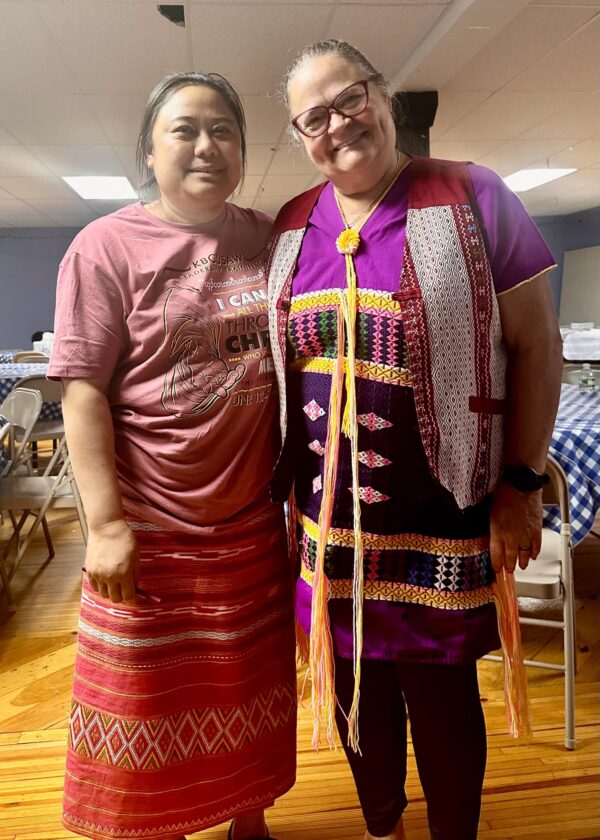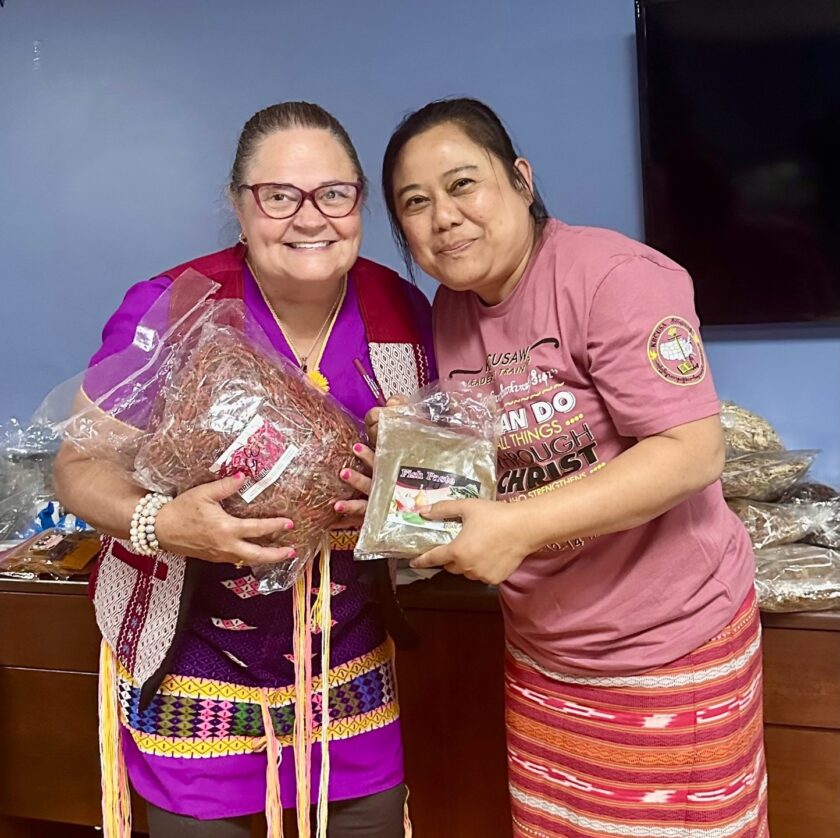Category: Alumni Spotlight
A Q&A with Mentor Mary Wood and Mentee Pehwah Mu: Thriving in Ministry
Thanks to the generous support of the Lilly Endowment, Central Seminary offers students in the final stages of their seminary journey a unique opportunity to participate in our mentoring program. This initiative pairs students with experienced clergy mentors who offer a safe, reflective space to discern and refine their sense of calling and ministry practice. The mentor-mentee relationship provides invaluable support during this critical time of transition and growth.
In 2024, Central had 27 active mentors, who hosted 143 mentoring sessions and served 30 students. Below, we have the privilege of hearing from Mary Wood and Pehwah Mu as they share the significance of their mentor-mentee relationship.

Q: Why did you want to be a mentor and what did you expect the experience to be like?
MW: I was asked to be Pehwah’s mentor, in part, because of my relationships with many Karen friends who have relocated to a third country, and along the Thailand-Burma (Myanmar) border over the past 21 years. Pehwah and I soon realized in our first session on Zoom that we shared several mutual friends. I lived for several months and have visited many times the same refugee camp where Pehwah lived prior to relocating to the USA. Pehwah received her education at Kawhoolei Karen Baptist Bible School and College at Mae La Karen Refugee Camp, Mae Sot, Thailand. I spent time teaching at KKBBSC over the past many years after she graduated which provided ample understanding of the situation in which she came from as a refugee from Myanmar (Burma). A mutual understanding of past experiences was very valuable as we conversed together in Central’s mentor/mentee program. Knowing many of the same people was helpful as we discussed personal situations or class assignments. Sharing a love of eating Karen food, especially fishpaste was also helpful!
PM: I wanted to have a mentor because I value having someone I can talk to when I face challenges or have questions, especially related to my assignments. Sometimes I want to explore certain topics more deeply, and I believe a mentor can guide me and connect me to useful resources. I also hope to build a meaningful relationship where we can learn from and support each other. I see the mentoring experience as a two-way journey of growth, encouragement, and shared learning.
Q: How was this experience meaningful for you?
MW: I appreciated Pehwah’s trust and confidence in sharing her experiences as a refugee. As we learned from each other, we shared helpful information when requested. I was her listening ear about classroom assignments, questions, and yearnings. She was my confidant to help me understand my two Karen “sons” who are still refugees living along the border. We leaned on each other’s understandings and found what I would describe as a true friendship.
Most recently, it was extremely meaningful for me to work with Pehwah at the Karen Baptist Church USA Women’s (KBCUSAW) Conference held in upstate New York. We worked off each other’s momentum. Pehwah translated for me at the conference, which was very helpful for me professionally. Personally helpful has been her assistance with translating recorded messages of quandary from my sons as they live as refugees in the refugee camp/along the borderland.
I also found it extremely meaningful to watch Pehwah grow as a leader in the church, and as a mother, and student. I am very proud to watch her maneuver through difficulties and find solutions. Pehwah knows how to seek support and bring a fullness of life and support to those around her.
PM: This experience was very meaningful to me because I have someone I can talk to openly—someone who listens to my ideas and thoughts and shares her own insights as well. It has created a two-way communication and a genuine relationship where we learn from each other. Having this support and connection makes me feel encouraged, understood, and motivated to grow both personally and professionally. And find the resources or connect me to someone that I need. Sometimes I worry about my English and grammar, but my mentor told me not to worry about that. Instead, I should just try to express my main focus or the topic.
Q: What was unexpected about the experience?
MW: Unexpectedly, I have relied on Pehwah’s help as much as she has relied on me as a mentor. Pehwah offered me support as I retired from pastoral ministry in March 2025. She encouraged me to continue to serve alongside the Karen after retirement and be open to more travel and teaching.
I also had many questions before/during the Women’s Conference [we worked on together]. I leaned on Pehwah not just for information but for emotional support. Although our time together in the mentor/mentee program has ended because Pehwah has graduated, we have remained in touch. Pehwah has become a good, constant friend.
PM: First, I didn’t know if or when I would have the chance to meet my mentor in person, but eventually, I did. To my surprise, she knew some of my classmates from back home, where we graduated from Mae La Kaw Thoo Lei Karen Bible School and College. Some of them became her students, while others work alongside her as coworkers.
Q: Without providing any confidential or personal information, do you have a story you can share about one of your most impactful discussions or issues you worked on together?
MW: Pehwah shared with me some needs of her children. I listened. Another occasion offered an opportunity for me to share the needs of my two Karen “sons” who live along the border (now serving as soldiers in the Karen army). She listened. I mean she really listened to me.
She understood the culture with more depth than any of my friends. To be able to share with another woman my heart of concern regarding children, the sharing of empathy was very life-giving to me.
PM: One of the most impactful moments in my mentoring journey was when I met my mentor in person for the first time during the Karen women’s leadership training in New York. I had the opportunity to interpret for her, which made the experience even more special and meaningful.
She has a genuine love for learning about my language and culture, and a deep passion for supporting my people. During one of our conversations, I told her that one day I dream of working alongside her—carrying her bag, learning from her, and doing ministry together.
She was touched by my words and encouraged me to pursue further education so I can be better prepared to serve. We prayed together, asking God to lead our steps and, if it is His will, to one day serve in ministry together as a team. That experience brought us closer and reminded me of the power of faith, shared vision, and mutual encouragement.
Q: Why is having a mentor important for seminary students?
MW: I found that the mentor program provides a mutual sharing and learning. Also, pairing mentee to mentor who share similar life experiences also helps. As a mentor, I had to remember that I was not one to have answers to fix problems for Pehwah, but a fellow traveler on her journey. Walking hand in hand is a much better image to consider when providing support to a seminary student. I found that there were some questions that Pehwah preferred to discuss and flesh out with me. Is that because building trust is one of the most important aspects of the mentor program? I think so. A mutual trust. We all need that in a fragmented world.
PM: Having a mentor is incredibly important for seminary students. According to my experience, it provides me with guidance, support, and spiritual accountability during a time of deep personal and theological development. A mentor, especially one who has experience in ministry and knows our situation, can help us navigate challenges with wisdom and perspective that goes beyond textbooks and lectures.
Mentors also serve as role models, demonstrating what faithful and effective ministry looks like in real life. My mentor and I discuss pastoral care, leadership, preaching, and navigating the day-to-day realities of serving in a church or ministry setting. This kind of hands-on wisdom helps bridge the gap between academic learning and real-world ministry application.
In addition, mentors provide a safe space for students to process their doubts, struggles, and experiences of personal growth. I am very blessed that Central has an often-mentored program to wrestle with complex theological questions or personal callings. A trusted mentor can offer encouragement, as I did with my mentor, pray with me, and support my needs with love. This relationship fosters resilience, humility, and maturity—key qualities for anyone preparing for a life of ministry. Ultimately, having a mentor helps me stay faithful, grow in character, and remain focused on my calling. It’s not just about learning what to do in ministry; it’s also about becoming the kind of person who can do it well. And I feel like I have someone who stands beside me and helps me follow my dream.
Pictured above: Pehwah Mu translating and Mary Wood playing guitar at Karen Baptist Church USA Women’s Conference, East Coast North Region in Syracuse, NY (June 2025)
Pictured above: Mary Wood holding dried chili and Pehwah Mu holding fishpaste—staple foods of the Karen hill tribe.
This mentor-mentee relationship highlights the power of community, shared wisdom, and mutual growth. Central’s Mentoring Program continues to be a transformative force for both students and mentors, creating bonds that enrich the ministry experience and support the development of future leaders in the church.
—

